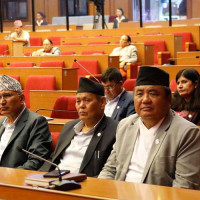- Thursday, 31 July 2025
Flexibility In Trade Ensures Economic Stability
In a flawed international system nations of various power potential follow their own national interests. In the complexity of multi-polar world order, opposing images, interests, capabilities, identities and ideologies of nations have become a source of conflict and wars. It, therefore, requires many tools to prevent conflicts, manage differences through dialogue, diplomacy, development cooperation and pursue enlightened shared interests on the basis of norms, values and principles of civilised conduct. Suppression of tariffs is one of them. The global security architecture created by the UN Security Council, regional security system and nuclear non-proliferation treaty are becoming feeble, lacking authority to enforce vital decisions pertaining to international peace.
New powers such as Japan, India, South Africa and Brazil are seeking permanent membership of the Security Council. Raging conflicts have overwhelmed the institutional and financial capacity of the UN to pursue sustainable development goals, organise peace building and manage the negative effects of climate change. The global financial system is hit by fractious geopolitics and trade tensions. It has entered into an era of heightened volatility. American President Donald J Trump’s imposition of worldwide tariffs, reshuffle of ties with allies, competitors and enemies, waning interest in the WTO and the UN and its specialised agencies, interventionist tone in the Western hemisphere and pivoting to Indo-Pacific strategy with the aim of restoring American primacy have splashed geopolitical ripples in the whole world with unsettling effects.
Distrust
Political realists of the US do not want to see the emergence of its security, economic and technology competitor China but cannot stop its economic, technological and diplomatic ascent as a super power. The pragmatists, however, do not perceive China a security threat but a big market and, therefore, engagement with it can yield global economic and political stability. The US does not view resurgent Russia a threat because it cannot either dominate Europe or confront the USA like the former Soviet Union. Realising the mistake of pushing Russia to China, President Trump sought to either neutralize or wean Russia from China through resetting of ties. Still distrust and escalation of conflict among nuclear powers might unleash catastrophic consequences.
The US-China ties are marked by both cooperation and competition in security, diplomacy, trade of basic goods and strategic commodities, technology and geopolitical influence surrounding Sino-Russian-Iran-North Korea ties, Taiwan and South China Sea. The return of the rule-based liberal trade regime created by the World Trade Organisation is vital as classical trade theory believes that trading nations create harmony of interests and thus contribute to stable peace. But the integrity of liberal trading regime is now disrupted by unilateral imposition of tariffs violating WTO rules and procedures and increasing costs for poor and small nations for the accessibility of global public goods. Recently, China and the USA have preferred diplomatic engagement to settle their divides on trade issues but geopolitical calculus strains world politics.
After protracted negotiations, the US and China have signed a trade deal aiming to ratchet down their tensions. China assuaged the US fear of supplementing its technological primacy by what it calls unfairly subsidizing its tech companies, non-market behaviour, unfair trading practices and America’s colossal trade deficits of $262 billion with China. China has expressed readiness to discuss these issues in the WTO meeting. The US had earlier imposed reciprocal tariffs on nations with which it has trade deficits, even the small and least developed ones. As US President Trump learned its negative effects on financial markets, trade disruption and consumer woes, he suspended the reciprocal tariffs for 90 days so that negotiation with the US will resume.
World’s two economies have the power and responsibility to shape the rule-based global economic system. Leaders of both nations have realised how much pain the two nations can inflict on each other in a reckless trade war. The US deems the current liberal trading system created by it unfair to its economy and people. The Sino-American trade deal is built on a framework that the US announced in June following US-China trade talks in London in which China had agreed to ease restrictions on rare earth minerals while the US had agreed to revoke the visa of Chinese students on US educational institutions. Earlier in the Geneva meeting, both sides agreed to reduce tariffs on their products. America reduced tariffs to 30 per cent and China to 10 percent.
The resolution of trade war is a precondition to mitigate other issues plaguing both nations. As per the deal, China has agreed to resume the supply of critical materials such as magnets and rare earth minerals to the US. They are indispensable for American manufacturing and microchip production, defense technology and electronics. In reciprocity, the US will lift a series of restrictive measures it has imposed on China including exports of advanced technology, computer chips and adoption of counter measures. Similarly, the US has allowed Chinese students to return to its colleges and universities. It is vital for resolving financial problems of American educational institutions and promotion of soft power diplomacy. Likewise, the US has reset tariffs from 30 per cent to 55 per cent while China has imposed just 10 per cent.
These mutual concessions have given diplomacy a stronger role and lifted the Asian share market to a positive direction. This is a strategy for rebalancing trade and improving relations in other areas. If the deal is not fully approved by August 10, the current pause may not convert into peace. Chinese President Xi Jinping also invited American President Trump to visit China so that strong bonds between the two can prevent disruption and disturbances in bilateral trade. It has already raised the expectation of the global community that it will mitigate the friction, create trust and avoid the Thucydides Trap of the inevitability of geopolitical conflict between the rising and declining superpowers.
After China, President Trump has declared the possibility of comprehensive trade deals with India before his imposition tariffs worldwide ends on July 9. In the yet to be finalised new trade deal, India prefers exemption from additional US tariffs, relief on labour-intensive goods such as textiles, shrimp, gems, leather products while putting others such as energy purchase and technology transfer on hold while the US wants cuts on EVs and farm goods. But the US has threatened India to face consequences in the areas of banking, IT and defense if it does not stop buying Russian oil and weapons which India finds profitable for its national interests.
Defying the American threat, India is trying to diversify its import of oil from the USA to Russia, Venezuela and African nations and exploiting its own reserves. It has also diversified export trade to Britain and Europe to neutralize the negative effects of tariffs. It feels unease over Trump hosting the Pakistani Army Chief in the White House and military support to Turkey which bolsters Pakistani defensive capacity. The US cannot ignore India, its strategic ally, in the Indo-Pacific strategy to counterbalance China. America has created an invisible security wall in the chains of Indo-Pacific islands and activated coastal guards of QUAD as a joint Sea Ship Observer Mission to deepen the grand strategy of maritime cooperation. This is in response to China’s blue water navy deemed by the USA a threat to its monopoly on maritime trade and security.
American senator Lindsay said that an economic Bunker Buster Bill is applied to every country that imports Russian resources — arms and oil. A bipartisan Bill in the US Senate threatens India, China and Russian allies with 500 per cent tariffs for continuing to purchase Russian oil. It aims to cripple Russia's energy revenue and BRICS strategy of de-dollarization aiming to curtail American economic hegemony. An element of fear has, however, gripped the Trump administration that execution of the Bill can undermine American efforts to mend relations with Russia, China and India and mediate the Russia-Ukraine, India-Pakistan and Israel-Iran escalating conflicts. The atavistic return of geopolitics and economic mercantilism threatens the age of rationalism, progress and peace.
A critical to security rivalry is North Korea’s game play. It has tested a powerful multi-headed new missile capable of targeting many areas at once and showed readiness to support Iran against Israel, a close ally of the US acting as a lynchpin of American foreign policy in the Middle East. Japan and South Korea are nervous about this. To assuage the fear, the US has mobilized effective deterrence. But owing to the huge tariffs, Japan and South Korea buy Russian oil despite US sanctions, sell US bonds and are reluctant to follow US foreign policy in Northeast Asia. China is Japan and South Korea’s largest trade partner. The increasing acceptance of the Chinese Yuan and the Indian Rupees may mark the weakening of US dollars and its domination of global economic governance so far.
A new global coalition of BRICS nations in pursuit of trade, money, development and multilateralism with win-win cooperation is expected to create leverage of the Global South and its political influence, economic opportunities and greater importance of the international institutions against American withdrawal and its sanctions. With the membership of BRICS growing, it holds the key to global liberal economic and political order based on sovereignty of nations, not domination or hegemony. Liberalism and non-alignment are hostile to wars. Both seek to control the anarchical tendency of international politics through the principles of Panchsheel.
Indonesia is easing import restrictions before the July 9 deadline for tariff negotiations set by the US and offering critical minerals projects to it. Other ASEAN nations, like South Asians, are finding difficulty to adjust to US tariffs for their different stages of development. The European Union, which is defining its new economic and security role, is ready to accept a 10 per cent American tariff but similar talks with Canada ended over digital service imposed on American tech companies. Instead of unilateralism in the global political economy, China is promoting regime building to enlarge the economy of scale and community of shared vision. It encourages the South Asian, Central Asian, African and Latin American nations to become part of China’s trade-creating and regime building strategies.
Functional cooperation
It is vital to create a functional basis of cooperation, create a buffer against extraterritorial predators and break the possibility of pushback. It is important for world leaders to formulate global institutions and rules of security, economic and political cooperation and address global issues such as poverty, inequality, climate change, conflicts, etc. unsettled by clashing views and create a legitimate order to regulate the behaviour of all nations through deft diplomacy.
Any move to the Middle East peace process forward rests not on one state replacing the other, regime change or escalation of conflict but guaranteeing the establishment of Palestinian state while also reducing existential threat to the survival of Israel. The US senate has rejected President Trump’s Iran war similar to the Vietnam or Afghanistan war, entailing him to pursue creative diplomacy. It may moderate tariff war as unproductive investments and inspire both allies and competitors of the US to build trust and restart a new era of collective management of global security, stability, progress and peace.
(Former Reader at the Department of Political Science, TU, Dahal writes on political and social issues.)



-original-thumb.jpg)



-square-thumb.jpg)









